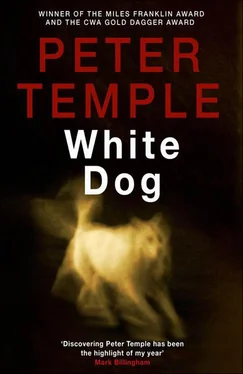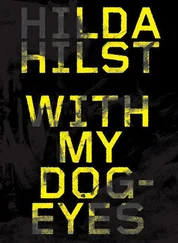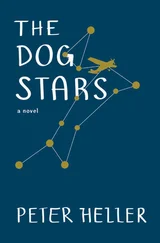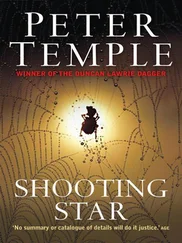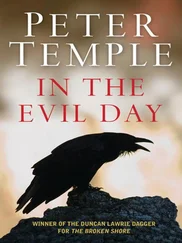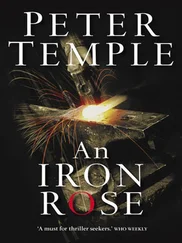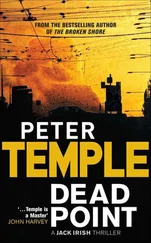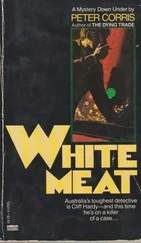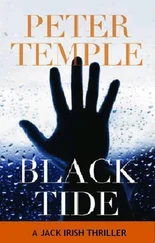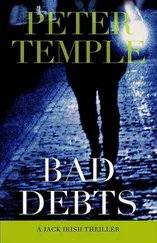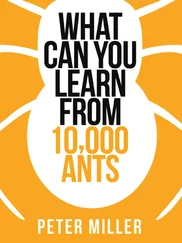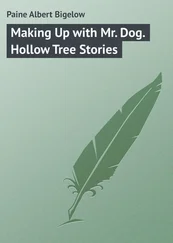Peter Temple - White Dog
Здесь есть возможность читать онлайн «Peter Temple - White Dog» весь текст электронной книги совершенно бесплатно (целиком полную версию без сокращений). В некоторых случаях можно слушать аудио, скачать через торрент в формате fb2 и присутствует краткое содержание. Жанр: Триллер, на английском языке. Описание произведения, (предисловие) а так же отзывы посетителей доступны на портале библиотеки ЛибКат.
- Название:White Dog
- Автор:
- Жанр:
- Год:неизвестен
- ISBN:нет данных
- Рейтинг книги:4 / 5. Голосов: 1
-
Избранное:Добавить в избранное
- Отзывы:
-
Ваша оценка:
- 80
- 1
- 2
- 3
- 4
- 5
White Dog: краткое содержание, описание и аннотация
Предлагаем к чтению аннотацию, описание, краткое содержание или предисловие (зависит от того, что написал сам автор книги «White Dog»). Если вы не нашли необходимую информацию о книге — напишите в комментариях, мы постараемся отыскать её.
White Dog — читать онлайн бесплатно полную книгу (весь текст) целиком
Ниже представлен текст книги, разбитый по страницам. Система сохранения места последней прочитанной страницы, позволяет с удобством читать онлайн бесплатно книгу «White Dog», без необходимости каждый раз заново искать на чём Вы остановились. Поставьте закладку, и сможете в любой момент перейти на страницу, на которой закончили чтение.
Интервал:
Закладка:
A man of taste and means, Anthony Haig. Or possibly just of means — taste was something the rich could buy.
‘Interesting, aren’t they?’
I turned. Behind me was the woman I’d seen across the room in the group with Steven Massiani.
‘You’re Jack,’ she said. ‘Tony pointed you out. I’m Corin Sleeman. I was married to Mickey.’
She had her hand out, close to her body. I took it. It was small, a child’s hand, my hand felt inflated, I felt like an enfolder.
‘It’s been horrible,’ she said. ‘A really bad dream.’
She had the face of a girl in a pre-Raphaelite painting, not the hair, which was blonded and careless, but the nose, the brow, the poreless skin, the innocent and expectant mouth. The pre-Raphaelite child in middle age, a face no less arresting for the signs of time.
‘At least we’ve woken up,’ I said. ‘Who are these painters?’
‘Corsicans,’ she said. ‘Tony collects Corsican art.’
‘He would have a corner on the market then,’ I said.
‘I liked Sarah’s work,’ she said. ‘I had her do a piece for a building in South Melbourne. The client’s wife hated it, loathed it, a Frankston girl, her father was a smash repairer.’
‘She’d know crumpled metal,’ I said. ‘It might have brought back memories of the days when her father started work by hosing off the blood.’
She started to smile, had pause. ‘Come and join us. You know Steven, I understand.’
‘We’ve met,’ I said.
We went down and to Steven Massiani, Haig and another man, his back to us. As we approached, he turned. He was overweight, balding, with round glasses on a small nose. I’d seen him before, in a photograph, walking down a street with Mickey Franklin. Bernard Paech, once a director of Mickey’s company, Yardlive.
‘Hello, Jack,’ said Massiani, hand out. ‘Good to see you looking well.’
‘You don’t know Bern,’ said Haig, ‘Bernard Paech. He works with me. With me but not always for me.’
I shook hands with Paech. He was smoking a cigar. ‘The co-director of Yardlive,’ I said.
‘Briefly,’ Paech said.
A waiter appeared. Everyone except Massiani took new glasses of champagne.
Haig raised his flute. ‘Health and happiness,’ he said.
We drank.
‘Steven’s joined me in the Seaton Square project,’ said Haig. ‘Corin’s done the redesign.’
I looked at Massiani. ‘Do I remember you saying you’d learned your lesson in the suburbs?’
He smiled, a shrug. I now saw in his face someone who had known unhappiness early, perhaps beginning in the preschool playground. ‘A good memory,’ he said. ‘Tony’s the great persuader. Plus we’ve saddled him with the risk.’
‘I’m not the great persuader,’ said Haig. ‘Bern’s the persuader.’
‘What happened to the objectors?’ I said.
‘Allayer of concerns,’ said Paech. ‘That’s what I am.’
‘Was that easy for Seaton Square?’ I said.
‘No more difficult than putting condoms on a bucketful of snakes,’ said Paech. ‘Well, marginally easier. New proposal. Scaled down. A good package. Subsidised childcare centre, public park, that sort of thing.’
He drew on his cigar, blew smoke at the ceiling. ‘Also the three main objectors changed their minds, a big help that was.’
Haig laughed. Corin Sleeman didn’t laugh, looked away. Massiani didn’t laugh either. He was looking down, holding his empty glass by the base and running his flat hand, the fingers, around the rim. Through the noise of talk, the soft music playing, I heard the thin, hollow high sound he was creating.
‘The important thing,’ he said, looking up, at Paech, ‘is that it’ll get built.’
Paech was about to speak but he didn’t.
‘And if it’s well done,’ said Massiani, ‘in a few years no one will remember the objections.’
‘That’s right,’ said Paech. ‘Exactly.’
He’d received the message.
Haig scratched his head. He had an amused look. ‘Jack,’ he said, ‘you haven’t had the tour.’
He took my arm and we crossed the room, went through a door into a passage. There was a glimpse of a kitchen on the left, three men and a woman standing at a counter, one man’s head down, close to the granite countertop.
‘The idiots,’ said Haig. ‘Like movies? I love movies. I watch one every day, that’s the minimum, I’ve watched five in a day, what kind of habit is that?’
He showed me into the first room off the passage to the right. It had two couches and a soft armchair facing a huge television screen, two smaller ones beside it. There seemed to be a dozen speakers on the electronic wall, and hundreds of tapes and CDs in racks.
‘I’m an insomniac,’ he said. ‘Also I can’t fucking get to sleep. I wake up on this couch, clothes on, the first thing I see is Grace Kelly kissing Cary Grant, the lucky bastard.’
We left the room, went down the corridor, Haig in front. He opened a door, found a switch, lights came on, not bright.
‘This is my special room,’ he said. ‘My special interest.’
It was a large space, a combination of library and museum, with tall bookshelves, glass cases, paintings and other framed objects in alcoves. There was a devotional feeling, the shadows, the way the light lay in soft pools and skewed rectangles, hung down the walls, the glow of colour in the paintings, the lustrous gilt of the frames.
‘My collection,’ he said.
I looked around the room. It was a museum and a shrine to Napoleon Bonaparte and it spoke of obsession and deep pockets.
‘You didn’t put this together by getting to French flea-markets before the crowds,’ I said.
Haig smiled, pleased, a boy’s smile. ‘You won’t believe the junk. After they brought his bits back from St Helena in 1840, Napoleonic memorabilia became an industry. Nothing like it again until Elvis.’
We toured, Haig pointing and explaining, not lecturing. There were hundreds of books on Bonaparte and his times, dozens of oil paintings and drawings of Bonaparte, five or six busts, bas-relief profiles and figures, statuettes, battlefield maps, a pistol, a sword, signed notes, letters and documents, a silver cup in a leather holder, a horse’s hoof on an ebony base, a lock of hair, a pair of boots, a telescope with gold inlay, a quill pen beside a silver inkpot, an ivory letter-opener, an ebony and silver baton, a fragment of a flag.
‘Why Napoleon?’ I said. We were looking at a single patent-leather shoe with a buckle of gold.
‘My father. He was a Corsican. Stefanu Leca. Steve Leca.’
He went to a bookshelf and took down a small, battered, cloth-covered book. ‘ The Life of Napoleon, by A. J. Danville,’ he said. ‘My dad bought this and a little English dictionary at a secondhand bookshop in Brisbane. He didn’t have any English. He got it from this book. At night, cutting cane all day.’
Haig showed me the edge of the book, dark marks.
‘Blood from his hand, the first few days. He’d never done any manual work. His father was a tailor.’
‘Where does Haig come from?’ I said.
‘My mother. My father was working on her father’s property near Bundaberg. He’d taught himself engines, bricklaying, plumbing, he could do anything, fix anything.’
He put the book away and stood with his back to the shelf, his face half in shadow as it was in the portrait. ‘My father put the daughter of the house up the pole. They chased him off the property like a fucking dog, threatened to kill him. She went to Sydney to have the baby, stayed there with her aunt, didn’t go back to Queensland till I was three.’
‘So you were raised as Haig.’
‘Yes, didn’t know anything about my father till just before my mother died. I was always told I was adopted. Then my mother told me. She was ill and she told me.’
Читать дальшеИнтервал:
Закладка:
Похожие книги на «White Dog»
Представляем Вашему вниманию похожие книги на «White Dog» списком для выбора. Мы отобрали схожую по названию и смыслу литературу в надежде предоставить читателям больше вариантов отыскать новые, интересные, ещё непрочитанные произведения.
Обсуждение, отзывы о книге «White Dog» и просто собственные мнения читателей. Оставьте ваши комментарии, напишите, что Вы думаете о произведении, его смысле или главных героях. Укажите что конкретно понравилось, а что нет, и почему Вы так считаете.
